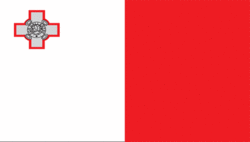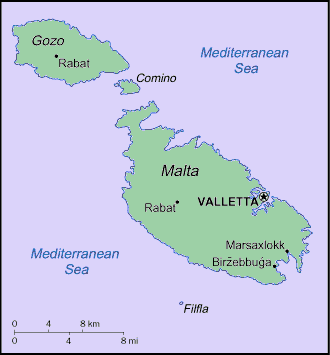Traveling Luck for Malta. Malta, Europe
Malta is located in Southern Europe, islands in the Mediterranean Sea, south of Sicily (Italy).
Land in Malta is mostly low, rocky, flat to dissected plains; many coastal cliffs.
Maltese land covers an area of 316 square kilometers which is slightly less than twice the size of Washington, DC
 Maltese national flag (Flag of Malta)
Maltese national flag (Flag of Malta)
As for the Maltese climate; Mediterranean; mild, rainy winters; hot, dry summers.
Maltese (singular and plural) speak Maltese (official), English (official).
Places of note in Malta
 Maltese map
Maltese map
Regions of Malta
Great Britain formally acquired possession of Malta in 1814. The island staunchly supported the UK through both World Wars and remained in the Commonwealth when it became independent in 1964. A decade later Malta became a republic. Since about the mid-1980s, the island has transformed itself into a freight transshipment point, a financial center, and a tourist destination. Malta became an EU member in May 2004.
Major resources are limestone, a favorable geographic location, and a productive labor force. Malta produces only about 20% of its food needs, has limited fresh water supplies, and has few domestic energy sources. The economy is dependent on foreign trade, manufacturing (especially electronics and textiles), and tourism. Continued sluggishness in the European economy is holding back exports, tourism, and overall growth.
Maltese natural resources include limestone, salt, arable land
the country comprises an archipelago, with only the three largest islands (Malta, Ghawdex or Gozo, and Kemmuna or Comino) being inhabited; numerous bays provide good harbors; Malta and Tunisia are discussing the commercial exploitation of the continental shelf between their countries, particularly for oil exploration
Maltese religion is Roman Catholic 98%.
Natural hazards in Malta include NA.
Travel Advice for Malta
MaltaSUMMARY
- The threat from terrorism is low. But, you should be aware of the global risk of indiscriminate terrorist attacks, which could be against civilian targets, including places visited by foreigners.
- Around 400,000 British tourists visit Malta every year. Most visits are trouble-free. The main type of incidents for which British nationals require consular assistance in Malta are for replacing lost/stolen passports and financial assistance.
- We strongly recommend that you obtain comprehensive travel and medical insurance before travelling. You should check any exclusions, and that your policy covers you for the activities you want to undertake. Please see Travel Insurance.
SAFETY AND SECURITY
Crime
Crime against tourists is rare although robberies, handbag snatching, pickpocketing and theft from parked cars can occur. Visitors should safeguard passports, money and other valuables; for example by using hotel safety deposit boxes.
Political Situation
Malta Country Profile
Road Safety
Caution should be exercised whilst driving as some roads are in a poor state of repair. Main arterial roads are in reasonable condition. You should keep to the speed limits. Local standards of driving are poor.
LOCAL LAWS AND CUSTOMS
ENTRY REQUIREMENTS
Single parents or other adults travelling alone with children should be aware that some countries require documentary evidence of parental responsibility before allowing lone parents to enter the country or, in some cases, before permitting the children to leave the country. This does not apply to Malta.
HEALTH
For further information on health, check the Department of Health’s website at: www.dh.gov.uk.
GENERAL

 Search
Search Malta country profile
Malta country profile Travel advice for Malta
Travel advice for Malta